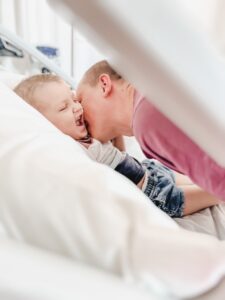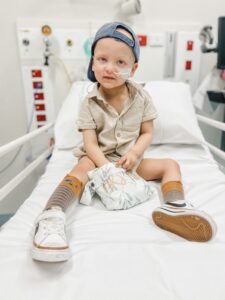There are many people who don’t want to hear the Darvell family’s story. It hurts too much to think about sick children, let alone really sick children. But those who scroll on miss out. Because the Darvell’s story is not just a sad or cautionary tale. It is a love story. Love, not as a feeling, as we so often think of it, but as an action. Love, which doesn’t know lengths it will go to, until it has no choice but to go there.
“It doesn’t feel rare when it happens to you”
Before his fall, Henry was the most active of Alex and Mark’s four children.
“He was always climbing things, running, jumping, just being really, really hands on. He was a handful,” Alex says.
So, when their two-and-a-half-year-old tripped and hit his head at the park, his parents assumed their energetic little boy was just a bit wobbly on his feet.
When they took him to the hospital, Alex and Mark were told he was concussed, and Henry was promptly discharged. But within 12 hours their son took a turn for the worse.
By the time Alex got him back to the Gold Coast University Hospital, Henry was constantly vomiting, he could barely walk, and he was turning grey.
The emergency care team immediately put Henry through a CT scan.
Immediately after the scan, Alex watched the doctor putting a canula into Henry’s arm get a call from the radiation department.
“I could tell by the look on her face something was wrong. I insisted she tell me. She said Henry had a tumor in his brain. I felt like a floated away. I didn’t even feel like I was in the room anymore.”
“I know that it’s out there… that kids get cancer, and it’s always described as being rare. But it doesn’t feel rare when it happens to you,” Alex says.
“Every time we did a scan, more things would pop up”
That conversation marked a new era in the Darvell family’s life.
For Alex, it was the first trickle of a stream of never-ending appointments, her maternity leave now indefinitely extended.
For Mark, it meant tag-teaming with Alex at the hospital on the days he wasn’t at work, and his nights catching up on more work.
For their other children, it meant less mum and dad to go around.
And, for Henry, it meant treatment.
But while Alex and Mark poured everything they had into that treatment, they haven’t yet had the joy of watching Henry get better and stay better.
The surgery to remove his tumour involved cutting through Henry’s cerebellum. Overnight, their once boisterous boy lost all the skills he’d spent his little life learning.
“He couldn’t walk, talk, eat, drink, swallow… he couldn’t move a muscle for quite a few weeks. He had to slowly relearn how to do all that stuff.”
Then came the chemotherapy.
“The kids are getting the same chemo as adults. And, in some cases, they give kids stronger doses because they know kids are resilient and it gives them a better chance. It’s a really harsh treatment, and it does devastating things to them.”
Three months after his surgery, Alex and Mark got more shocking news.
Henry’s initial diagnosis, a medulloblastoma with a 90% survival rate, was incorrect.
Further analysis of his tumour revealed it was an Atypical Teratoid Rhabdoid Tumour (ATRT) – a rarer type of cancer with a higher likelihood of coming back, and a 30% survival rate.
Henry was immediately taken off chemotherapy and given radiation treatment, where had to be sedated every weekday for six weeks.
His radiation was followed by three rounds of high-dose chemotherapy – each round brought on a wave of painful side effects.
“The treatment gave him ulcers from his mouth to his intestinal tract. It’s painful, our kids end up on IV nutrition because they can’t swallow anything, they just vomit it straight up.”
“For every two days of chemo, he’d spend three weeks recovering. There were days where he’d have to be bathed from head to toe every six hours to stop the drug seeping through his skin and giving him a chemical burn.”
And, just when Alex and Mark thought the worst of it was over, Henry developed radiation necrosis.
“He was using a walker, in a few months he would have been walking on his own, and then overnight he couldn’t use his leg or hand.”
“Slowly but surely, he regressed back to where he was post-surgery. He couldn’t move a muscle.”
“Every time we did a scan more things would pop up. We’d deal with one thing, then there would be more symptoms of something else. It’s been a really, really hard 15 months,” Alex says.
The worse their circumstances, the better they become
Yet, whenever a new challenge comes, Alex and Mark wearily rise to meet it.
Once a retail manager, Alex has become a health professional in her own right. For Henry, she’s a physiotherapist, a speech therapist, and a nurse.
“You’re the best chance they have to get better. They can’t talk for themselves; he can’t say, ‘Mum I need some physio today’. You’ve got to know what he needs.”
“I was his nurse on the days when he didn’t want a stranger to treat him. I learned how to do his obs and use the IV machine, because it saved him that little bit of stress that day.”
“I had no idea about any of that stuff, you just learn it so you can give him the best chance.”
“Before this, I didn’t feel comfortable in a hospital but now it’s my second home,” Alex says.
Meanwhile, Mark crams his full-time job into three days a week.
“That’s a sacrifice he has to make to keep his job and to provide for his family. It’s a lot of pressure for him.”
“When he goes to work and I go to a scan, there’s always the possibility our lives could be turned upside down and he won’t be there. So, he goes in feeling anxious all day and is just sitting there waiting for me to update him and say everything is okay,” Alex says.
Cautious hope amidst immeasurable uncertainty
In the face of a thousand unknowns, Alex has cautious hope for Henry’s future.
“We like to focus on his recovery. But it’s going to take time.”
“While he has no evidence of disease since surgery, they find it hard to tell the difference on an MRI between radiation damage and the tumour coming back. Two years post-treatment is usually when it comes back. He’s now in the highest risk of recurrence at six months post-treatment.”
“I’m really hopeful that things are going to be better now. It’s a daunting thought but, I look at it like he’s got a year and a bit to be prepared for school,” Alex says.
Until then, their family’s life is both chaotic, and at a complete standstill.
Days rush past, packed with appointments, school runs, shopping, lunchboxes, washing, and all the other tasks that leave parents slumped on the couch at night, too tired to cook for themselves. Yet the weeks between scans and results, and the months between treatment and milestones, they stretch out like an eternity.
“It’s going to be a long time before we ever feel safe and that it’s not coming back. It’s hard to feel positive all the time,” Alex says.
And it’s true, the Darvells are not always positive. Often, they are overwhelmed, exhausted, scared, angry, sad, and hurt. And that’s okay. Because in their story, love is not a feeling, it’s an action.


